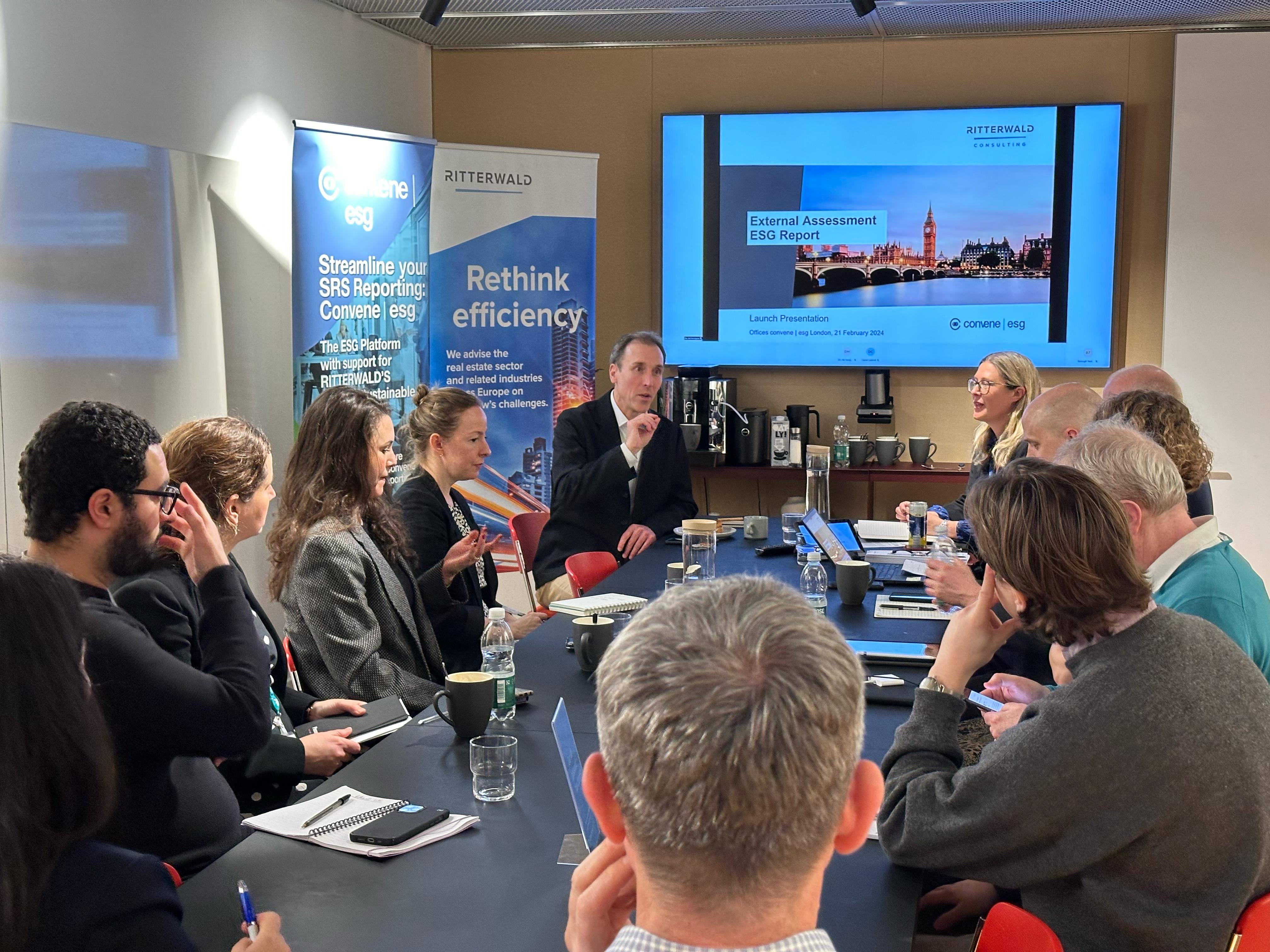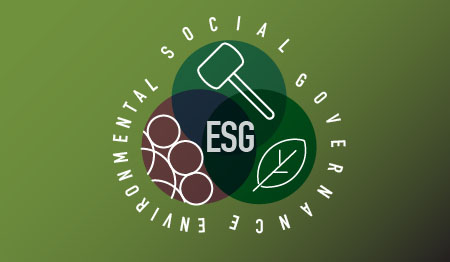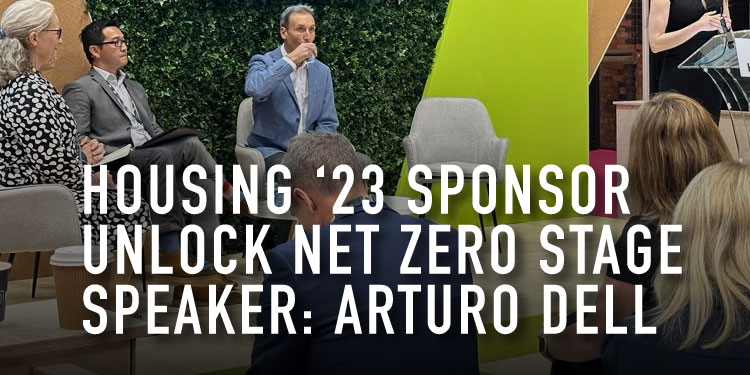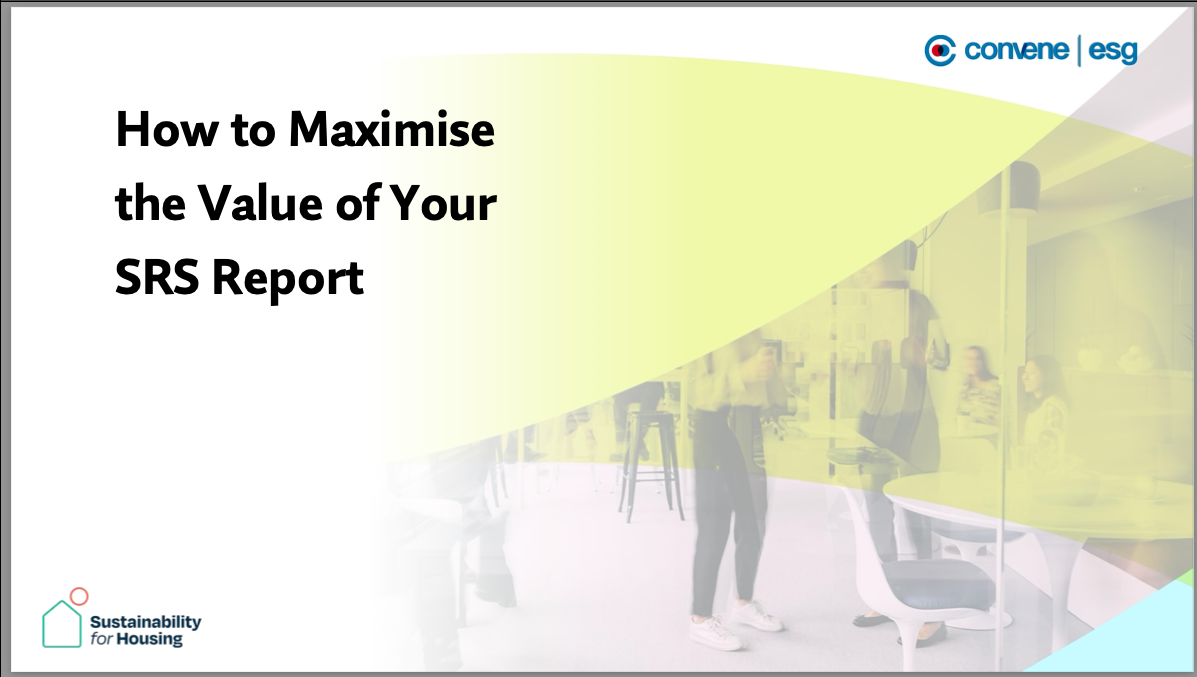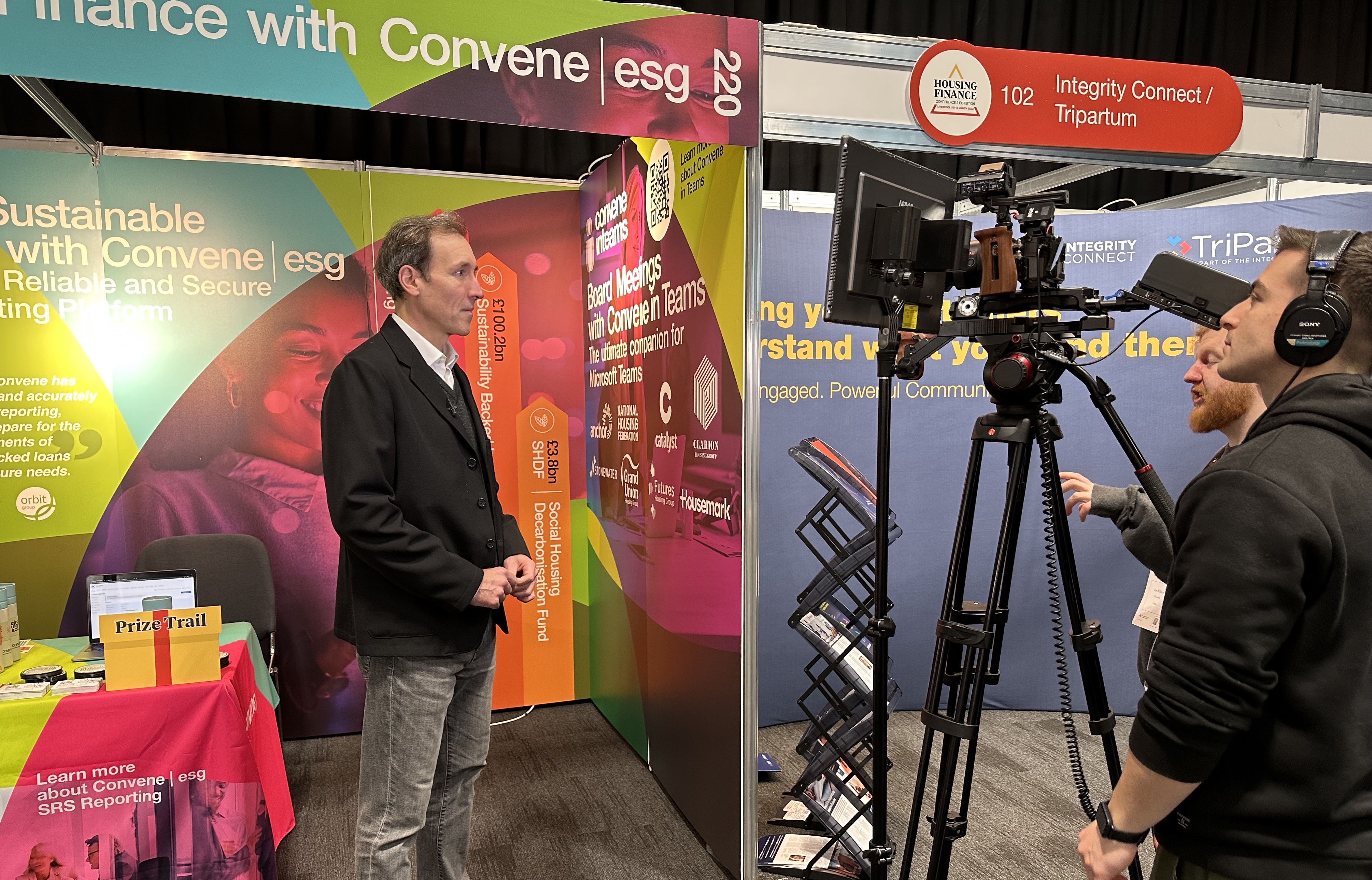Convene ESG have recently been informed that some KPMG clients have been told to ensure their ESG reports should be auditable. Before we deep dive into why this is the case, it is important that you know Convene ESG provides a complete audit trail that is available to be exported at a moment’s notice. If you would like to learn more about Convene ESG’s extensive capabilities, please see our full features page.
2 min read
Why Your ESG Report Should Be Auditable?
By Gabriella Mangham on 01/05/24 14:52
Topics: Governance Sustainability ESG SRS for Social Housing Housing
2 min read
Convene ESG and RITTERWALD Host Housing Associations and Lenders Lunch
By Gabriella Mangham on 26/02/24 13:57
On the 21st February Convene ESG and RITTERWALD hosted a lunch to help facilitate a network and discussions between housing associations and lenders about the realities of ESG Reporting and Financing. We wanted this to be an opportunity to air grievances and see the paths forward, and thankfully there were many productive conversations that have started because of this.
Topics: ESG SRS for Social Housing Housing
2 min read
Webinar: Convene ESG looks forward for 2024
By Gabriella Mangham on 20/02/24 16:26
Today Convene ESG hosted yet another successful webinar about what you can expect in the Housing ESG realm in 2024.
Topics: Sustainability ESG SRS for Social Housing Housing
3 min read
Webinar: Convene ESG & The Good Economy
By Lottie Wright on 05/12/23 14:26
Today we hosted our final webinar in our SRS for Social Housing series for this year. This webinar focused on SRS Version 2.0, and we were joined by Andy Smith from The Good Economy to help us get up to speed on this update.
Here is a brief summary of the discussions.
Topics: SRS for Social Housing
3 min read
Webinar: Anna Haskins talks SRS 2.0.
By Gabriella Mangham on 24/10/23 12:23
Today we hosted yet another insightful webinar in our SRS 2.0. Series. This time we were joined by Anna Haskins from The Good Economy to discuss the implications of the SRS 2.0. and how Housing Associations should prepare themselves to report against it. Here is our brief summary of the discussions.
Topics: SRS for Social Housing
4 min read
Convene ESG Hears From Experts At Networking Event
By Gabriella Mangham on 18/10/23 10:03
Last week Convene ESG hosted another networking event for Housing ESG professionals. We had many interesting discussions during the cocktail hour about how best to approach ESG as an organisation. A common topic was how Housing Associations are working to embed a culture of ESG in their day-to-day activities.
Topics: Sustainability ESG SRS for Social Housing Housing
7 min read
Housing Insight: Why ESG Reports Matter
By Lottie Wright on 29/09/23 14:28
On the 20th September, Prime Minister Rishi Sunak announced an overhaul of policies intended to help the UK meet its target of cutting carbon emissions to net zero by 2050.
The prime minister said the UK could afford to adopt a more “pragmatic, proportionate and realistic” approach to achieving net zero.
This policy overhaul from the government leaves Housing Associations in limbo. It is unclear how the Sector should move forward with sustainability and decarbonisation plans.
This means it is more important than ever for Housing to be on top of their ESG reports, as it provides something to rely on in the face of uncertainty.
But what exactly did the Prime Minister’s announcement say, and what does this mean for Housing Associations moving forward?
What did Rishi Sunak’s announcement say?
The Prime Minister announced that targets to get households to switch away from fossil fuel boilers were being relaxed. Alongside this, he announced plans for tougher energy efficiency rules for landlords were being ditched. He also declared the ban on the sales of new petrol and diesel cars was being pushed back, from 2030 to 2035.
Three years ago the government set out its “preferred policy scenario” of all private landlords achieving Energy Performance Certificate rating C. For new tenancies this was from 2025, and for existing tenants it was by 2028.
Tenant bodies are outraged by the abandonment of this policy, amid concerns that the much-awaited Renters Reform Bill might face a similar fate.
Sunak claimed he would still “encourage” households to improve their energy efficiency, but that “under current plans, some property owners would have been forced to make expensive upgrades in just two years’ time”.
Additionally, the Prime Minister declared a 50% increase in financial support for grants under the government's boiler upgrade scheme. He said he does not want to impose costs on “hard-pressed families” at a time “when technology is often still expensive”.
While this might sound appealing, the 2035 deadline for putting in new boilers remains unchanged. The only new policy being the promise of an exemption for those who would find the switch to heat pumps the “hardest”.
The Prime Minister said this overhaul “doesn’t mean” he is “any less committed to decarbonising our homes”.
A significant portion of these changes will affect the Housing industry in one way or another. This Sector was already making progress towards the country's net zero goals by enhancing the energy efficiency of many homes, as well as starting to report on ESG through the SRS.
The changes leave many Housing Associations uncertain on how to proceed, as the details of what this means for the Sector has not been made clear by the government.
What is the response from the Housing Sector?
The potential impact of these changes for Housing Associations cannot be ignored. Many in the industry have already come out to share their thoughts on the upcoming changes and what they could mean for the Sector.
Kate Henderson, chief executive of the National Housing Federation, said it is “hugely disappointing” to see the government “row back from its commitments to net zero, particularly on improving the energy efficiency of our homes”.
She stated: “England’s homes are among the oldest and draughtiest in Europe. Making homes more energy efficient is a win-win, not only helping to save our planet, but also boosting our economy by creating jobs and, crucially, saving money.”
Rachelle Earwaker, senior economist at the Joseph Rowntree Foundation, said easing the regulations on energy-efficient homes is “ill advised and ill considered”.
She added: “If we don’t invest in energy-efficient housing and more sustainable and affordable energy solutions, the only certainty is frighteningly high energy bills and poor health outcomes.”
Dan Wilson Craw, deputy chief executive of Generation Rent, said scrapping higher standards for rental properties is a “colossal error” by the government, and that “energy efficiency” is an “essential part of a home’s quality”.
He stated that abandoning these policies is “both cruel and out of proportion to what the prime minister wants to achieve.”
What does this mean for Housing Associations?
Overall, this presents a huge problem for the Sector, which was already challenged with the enormous responsibility of reducing carbon emissions. Now, the industry is confronted with even more uncertainty regarding the government's objectives.
There are also significantly diminished prospects of securing the necessary funding to aid in decarbonisation.
Rishi Sunak and the government have promised a “pragmatic” transition in which the public continues to rely on gas boilers, ignore the issue of energy inefficient housing, delay the serious adoption of electric vehicles until 2035, and somehow, miraculously, achieve the significant reductions in carbon dioxide emissions necessary to achieve net zero.
The lack of clarity on how to move forward with sustainability plans, and how to give tenants the best quality service possible in spite of government policy, means a challenging road ahead.
All this highlights is that it is more important than ever for Housing Associations to communicate with their tenants, and assure them that their needs are your top priority.
The Sector needs to be able to ensure their environmental efforts are being demonstrated, and the public is made aware of them. Whether this be in energy efficiency and ESG goals or beyond, communication between Housing providers and tenants is crucial.
Additionally, with the possibility of more funding from the government appearing more and more unlikely, financing for Housing Associations is going to become more and more competitive.
With investors and consumers alike focusing on sustainability and ESG, reporting effectively and clearly, and showing your environmental progress is going to be critical in the face of these changes.
The earlier you start reporting, the more secure you can be in the face of instability within the Sector.
Why ESG Reports are more important than ever?
As well as achieving its target of net zero emissions by 2050, the UK government has to meet interim “budgets” along the way. Ministers have yet to flesh out important details of Sunak’s policy changes — such as exactly which households might be exempt from having to ditch fossil fuel boilers — so the impact on emissions is hard to calculate at this stage.
Moving forward, the Sector should continue to strive towards sustainability, and this means focusing on what you can do; ESG reporting, and the SRS.
Publishing an ESG report sets out your clear intentions for your organisation’s future, and its future projects. It includes your current investments and future investments into ESG. This will allow your potential investors to have a complete idea of how their money will be spent.
These announcements may make it seem like ESG should be less of a concern for the Housing Sector. The targets proposed by the government are unclear, and the elections next year may mean that it will all change yet again anyway! However, the Housing Sector has always pushed to be ahead of the curve, when government regulations are lacking, it is up to Housing Associations to provide the best service possible for their tenants.
Furthermore, investors, banks and loan providers will still be focused on providing green loans and ESG funding to Housing Associations. However, access to this money will be increasingly competitive without potential government assistance. The sooner you start reporting the more evidence you will have to provide investors of your year-by-year progress.
The SRS will also soon be launching their Version 2.0. which will address some of the common concerns that investors have. This will also help push the Sector forwards. During these uncertain times it is better to be ambitious than “realistic”, especially with the upcoming changes to the SRS allowing for a “comply or explain” approach.
The SRS helps level the playing field for all Housing Associations in terms of ESG by giving a criteria for them to focus on. Organising a standard allows the whole Sector to come together to determine what matters to them around the E, the S and the G in ESG.
The Housing Sector is one of the nations’ biggest polluters; if Net Zero is to ever be achieved then it is necessary to act sooner rather than later.
How Convene can help you with ESG Reporting
Here at Convene we have developed our own ESG reporting tool: Convene ESG.
Convene ESG is designed for Housing Associations with the assistance of Housing Associations. Our Early Adopters discussed with us what they needed, and with their requirements we developed a tool that would help Housing Associations generate the best ESG reports possible.
With Convene ESG you can compare benchmarks, organise your report, assign sections, automate reminders and input your ESG data and the solution will create a report ready to publish or edit as necessary. You can also input the data once and report against multiple different frameworks. This means you can provide lenders and your tenants with both a TCFD, RITTERWALD and SRS Report without repeating the work every time!
With the SRS Version 2.0 coming out this week, it’s as good a time as any to start ESG reporting.
This updated version has been produced using feedback from Adopters, Endorsers, and supporters of the Standard, and should help your association even further on your ESG journey.
You can find more about how Convene ESG can help your Housing Association here, or you can keep up with our dedicated events including networking opportunities and webinars here.
Topics: Sustainability ESG SRS for Social Housing Housing
2 min read
Webinar: Convene ESG and RSM discuss the SRS
By Gabriella Mangham on 12/09/23 10:22
Last week (after a few technical difficulties) Convene ESG joined RSM to produce a star-studded webinar. We were joined by Anna Haskins from the Good Economy, Michael Cook from Thirteen Group, Steven Radcliffe from RSM and of course our very own Arturo Dell.
Topics: SRS for Social Housing
3 min read
Webinar: Richard Hunt from CAF Bank
By Gabriella Mangham on 15/08/23 14:12
Today Convene ESG hosted another constructive webinar, this time we were joined by Richard Hunt from CAF Bank to talk about what borrowing green loans looks like.
Green Loans are a loan that the borrower has to exclusively use for sustainability projects. Increasingly in the Housing Sector, this means providing the lender with an SRS Report. During this webinar, Richard Hunt explained that there are 4 components that go together to form a Green Loan:
Use of Proceeds -demonstrating what the green loan will be used for.
Project Evaluation and Monitoring - ensuring funds are used appropriately.
Management of Proceeds - separate green loan bank account and providing invoices.
Reporting - ongoing proportionate reporting on the project.
Richard Hunt also detailed that we need a holistic approach. Sustainability is on everyone’s agenda, both customers, financing organisations and housing associations acknowledge its importance, but no one can make economic or governing decisions without data. The benefit of green loans may be the discounts, but the tying together for a common purpose is the key point. Energy efficiency and environmental sustainability is economically sound not only because for some rent and heating are costing the same amount but also because it will provide better risk management.
Sustainability in finance and green loans are the future, so investing now will save money in not only the short but also the long-term. If you would like to learn more, please rewatch the webinar here.
From all of us at Convene ESG, we want to thank Richard Hunt for his valuable insights and for sharing his knowledge. We believe that the Housing Sector working together can make great strides towards positive change, and Green Loans are a major part of this. Convene ESG want to be able to host more discussions like this in the future and already have some major events planned. To see more, visit our events page here.
Topics: ESG SRS for Social Housing Housing
2 min read
Convene ESG host Social Housing networking evening
By Josh Cole-Hossain on 24/07/23 17:26
On June 15th, the Convene ESG team hosted a networking evening at House of St Barnabas in London attended by governance and sustainability professionals in the social housing sector as well various guests invited by Convene ESG to give their insights into how ESG reporting is evolving in the housing sector.
Topics: ESG SRS for Social Housing Housing
5 min read
Convene sponsors the 2023 Housing Conference
By Lottie Wright on 30/06/23 09:42
Over the 27th, 28th and 29th June 2023, Convene sponsored the Unlock Net Zero stage at the Housing 2023 conference, Europe's largest housing festival and annual conference. We’d like to thank the Chartered Institute of Housing for setting up an incredibly engaging and collaborative event, as well as all our fellow attendees for making it such a memorable conference.
The conference provided us the chance to learn about, engage with and keep ahead of industry trends, as well as the opportunity to collaborate and converse with many people within the sector.
This year the conference looked to explore governance, risk, tenant voice, changing and resetting business plans, the importance of social care, health and housing integration, professionalism, reputation, the cost of living crisis amongst many other topics over the three days.
Topics: ESG SRS for Social Housing Housing
6 min read
How Does An ESG Software Save You Money?
By Gabriella Mangham on 22/03/23 17:31
Forbes estimates that organisations can save up to $4 million annually through automating simple processes with software. It has also been proven time and time again that investing in ESG saves you money. But why is this, and how can you apply this to your ESG reporting?
Topics: Sustainability ESG SRS for Social Housing Why Convene?
4 min read
Webinar: ESG Reporting: Cutting through the complexity
By Gabriella Mangham on 21/03/23 16:41
Today Convene ESG sponsored Inside Housing’s Webinar on “ESG Reporting: Cutting through the complexity”, with guest speakers including Andy Smith(The Good Economy), Julie McDowell (Chair, Blackwood Housing), Russell Smith (ESG Lead, Orbit Group), Brendan Sarsfield (Chair, Sustainability for Housing) and our very own Arturo Dell (Convene ESG). We want to thank everyone for an insightful discussion into the status and future of ESG in Housing. In case you missed it, here are our key takeaways.
Topics: ESG SRS for Social Housing Housing
3 min read
Housing Finance 2023: What We Learnt
By Lottie Wright on 16/03/23 19:07
On the 15th and 16th of March, Convene attended the Housing Finance Conference and Exhibition 2023 in Liverpool. We want to thank the NHF, as well as all speakers and attendees for putting on and participating in an engaging and insightful conference. If you missed our talk, please join us at our Inside Housing Webinar next week.
The Housing Finance Conference focused on ‘building resilience through turbulent times’, and featured many interesting talks on topics surrounding the cost of living, sustainability and green finance, cybersecurity and the future of the housing sector.
Topics: Governance Switching Board Portal ESG SRS for Social Housing Housing Why Convene?
4 min read
How To Integrate ESG into Your Housing Governance Processes
By Gabriella Mangham on 10/03/23 17:09
Housing Associations are paving the way for other sectors with their ESG efforts, but the task of ESG shouldn’t just fall on one ESG manager. ESG needs to be integrated into everyone’s day-to-day task management and governance processes. Here are our helpful tips on how this can be achieved simply and seamlessly.



